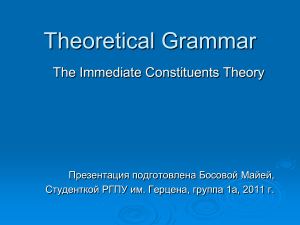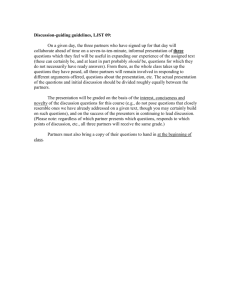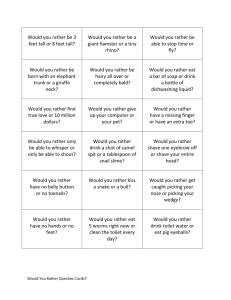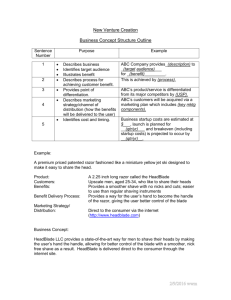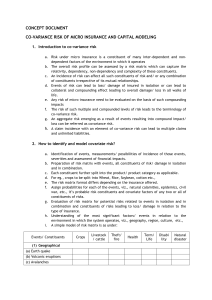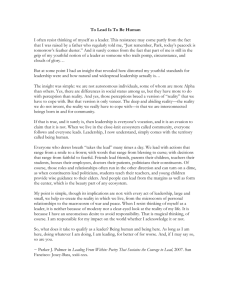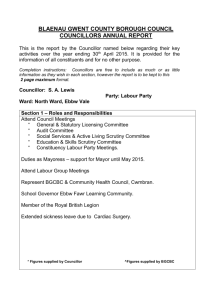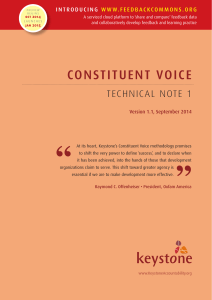[Compiled on the basis of the lectures of prof
advertisement
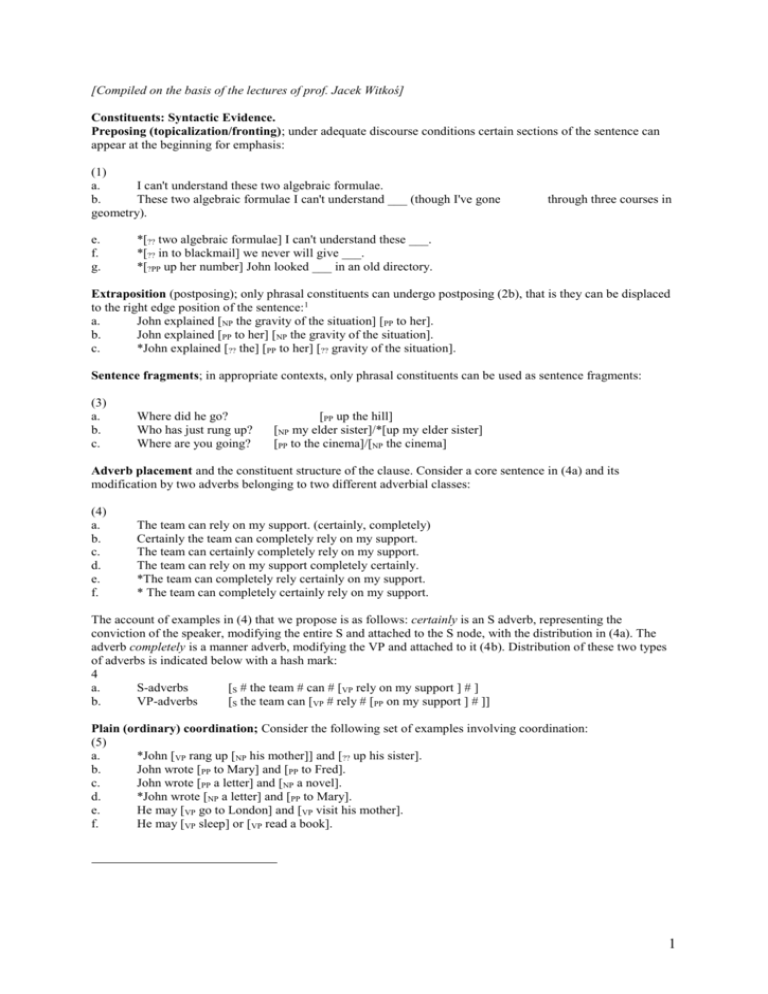
[Compiled on the basis of the lectures of prof. Jacek Witkoś] Constituents: Syntactic Evidence. Preposing (topicalization/fronting); under adequate discourse conditions certain sections of the sentence can appear at the beginning for emphasis: (1) a. I can't understand these two algebraic formulae. b. These two algebraic formulae I can't understand ___ (though I've gone geometry). e. f. g. through three courses in *[?? two algebraic formulae] I can't understand these ___. *[?? in to blackmail] we never will give ___. *[?PP up her number] John looked ___ in an old directory. Extraposition (postposing); only phrasal constituents can undergo postposing (2b), that is they can be displaced to the right edge position of the sentence: 1 a. John explained [NP the gravity of the situation] [PP to her]. b. John explained [PP to her] [NP the gravity of the situation]. c. *John explained [?? the] [PP to her] [?? gravity of the situation]. Sentence fragments; in appropriate contexts, only phrasal constituents can be used as sentence fragments: (3) a. b. c. Where did he go? Who has just rung up? Where are you going? [PP up the hill] [NP my elder sister]/*[up my elder sister] [PP to the cinema]/[NP the cinema] Adverb placement and the constituent structure of the clause. Consider a core sentence in (4a) and its modification by two adverbs belonging to two different adverbial classes: (4) a. b. c. d. e. f. The team can rely on my support. (certainly, completely) Certainly the team can completely rely on my support. The team can certainly completely rely on my support. The team can rely on my support completely certainly. *The team can completely rely certainly on my support. * The team can completely certainly rely on my support. The account of examples in (4) that we propose is as follows: certainly is an S adverb, representing the conviction of the speaker, modifying the entire S and attached to the S node, with the distribution in (4a). The adverb completely is a manner adverb, modifying the VP and attached to it (4b). Distribution of these two types of adverbs is indicated below with a hash mark: 4 a. S-adverbs [S # the team # can # [VP rely on my support ] # ] b. VP-adverbs [S the team can [VP # rely # [PP on my support ] # ]] Plain (ordinary) coordination; Consider the following set of examples involving coordination: (5) a. *John [VP rang up [NP his mother]] and [?? up his sister]. b. John wrote [PP to Mary] and [PP to Fred]. c. John wrote [PP a letter] and [NP a novel]. d. *John wrote [NP a letter] and [PP to Mary]. e. He may [VP go to London] and [VP visit his mother]. f. He may [VP sleep] or [VP read a book]. 1 The inescapable conclusion seems to be that only constituents (mostly) belonging to the same grammatical category (NPs, VPs and PPs) can be coordinated. At the same time note that the process of conjunction is sensitive only to the grammatical category of the conjuncts and does not force them to be of exactly the same sub-categorial type. For instance it is only relevant for coordination that two VPs are coordinated in (27f) and it does not matter that one of them includes an intransitive and the other a transitive verb. The same conclusion concerning the categorial identity of the conjuncts follows from shared constituent coordination (right node raising), a more sophisticated kind of coordination occurring in verb phrases whose verbs share the same complement. Again, the string of words shared by both verbs must be a possible constituent in each of the conjuncts: 28) a. b. c. John denied [..] but Fred admitted [NP complicity in the crime]. John walked [..] and Mary ran [PP up the hill]. *John rang [..] and Peter picked [?? up Mary]. Pronominalization; pronouns, or more generally pro-forms refer back to other constituents in the sentence/discourse (antecedents) and can be used in their place. It also seems that they can stand only for entire constituents (phrases): (6) a. b. c. d. e. Do you know [NP the man who wrote two papers on generative syntax last Yes, I know him. (pro-NP) Have you ever been to Alabama? Yes, I've been there. (pro-PP) I might go home and so might Susan. (pro-VP) The book is on the table. It is interesting. Betty has passed all her tests. I know it. I hope she has passed the test. *I hope it. year]? f. g. VP ellipsis; under certain circumstances a VP (phrasal constituent) can be omitted in the structure (ellipted) as long as it can be recovered from the context (immediately preceding text or conversation). In most cases the lexicalized VP (the antecedent to ellipsis) precedes the ellipsis site. The following examples show that only the entire VP can be ellipted and what cannot happen is that the verb is ellipted and its nominal complement, certainly a part of VP, is lexicalized, as in (31c): (31) a. b. c. d. e. John won't ring up his mother! I bet he will. *I bet he will ring. I want to close the shop early but Betty doesn't want to. John won't put the vodka into the drink but his brother will. The ellipted VPs are: [VP ring up his mother] in (31b), [VP close the shop early] in (31d) and [VP put the vodka into the drink] in (31e) How to test the structure? does this string of words have the same distribution as a phrase of a give type? b. does this string of words undergo movement together? c. can it serve as a sentence fragment? d. does it permit internal positioning of adverbs? If so it is an S or VP if not it is an AP or NP. e. what can it be coordinated with? f. can it serve as a shared constituent? g. can it be replaced by a pro-form? h. can it undergo VP ellipsis? [Compiled on the basis of the lectures of prof. Jacek Witkoś] 2 Exercises 1. a) Is the string of words: [shave in the morning] a constituent in the example below? Use at least three criteria to justify your answer: There was a power outage so peter did not shave in the morning. b) Which bracketed words are constituents in the following sentences? [the boy] took a [very big] bite. The girl in [the red] suit [looks like] Sally. The [young man] has been [waiting there] [about ten] minutes. [go] and[get me] some three [inch nails]. He [picked out] the book [he] wanted to [give me]. His [friend’s dogs] are [big and noisy]. [Her new] coat has [large leather] buttons. My [wife’s cousin] taught English [for years] at a [liberal arts] college. Exercises 2. a) Is the string of words: [shave in the morning] a constituent in the example below? Use at least three criteria to justify your answer: There was a power outage so peter did not shave in the morning. b) Which bracketed words are constituents in the following sentences? [the boy] took a [very big] bite. The girl in [the red] suit [looks like] Sally. The [young man] has been [waiting there] [about ten] minutes. [go] and[get me] some three [inch nails]. He [picked out] the book [he] wanted to [give me]. His [friend’s dogs] are [big and noisy]. [Her new] coat has [large leather] buttons. My [wife’s cousin] taught English [for years] at a [liberal arts] college. Exercises 3. a) Is the string of words: [shave in the morning] a constituent in the example below? Use at least three criteria to justify your answer: There was a power outage so peter did not shave in the morning. b) Which bracketed words are constituents in the following sentences? [the boy] took a [very big] bite. The girl in [the red] suit [looks like] Sally. The [young man] has been [waiting there] [about ten] minutes. [go] and[get me] some three [inch nails]. He [picked out] the book [he] wanted to [give me]. His [friend’s dogs] are [big and noisy]. [Her new] coat has [large leather] buttons. My [wife’s cousin] taught English [for years] at a [liberal arts] college. Exercises 4. a) Is the string of words: [shave in the morning] a constituent in the example below? Use at least three criteria to justify your answer: There was a power outage so peter did not shave in the morning. b) Which bracketed words are constituents in the following sentences? [the boy] took a [very big] bite. The girl in [the red] suit [looks like] Sally. The [young man] has been [waiting there] [about ten] minutes. [go] and[get me] some three [inch nails]. He [picked out] the book [he] wanted to [give me]. His [friend’s dogs] are [big and noisy]. [Her new] coat has [large leather] buttons. My [wife’s cousin] taught English [for years] at a [liberal arts] college. 3
